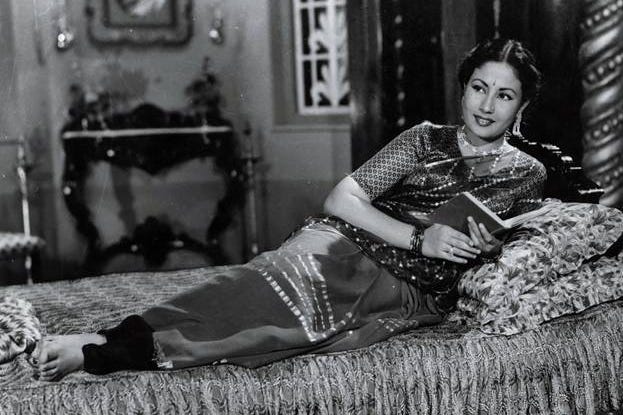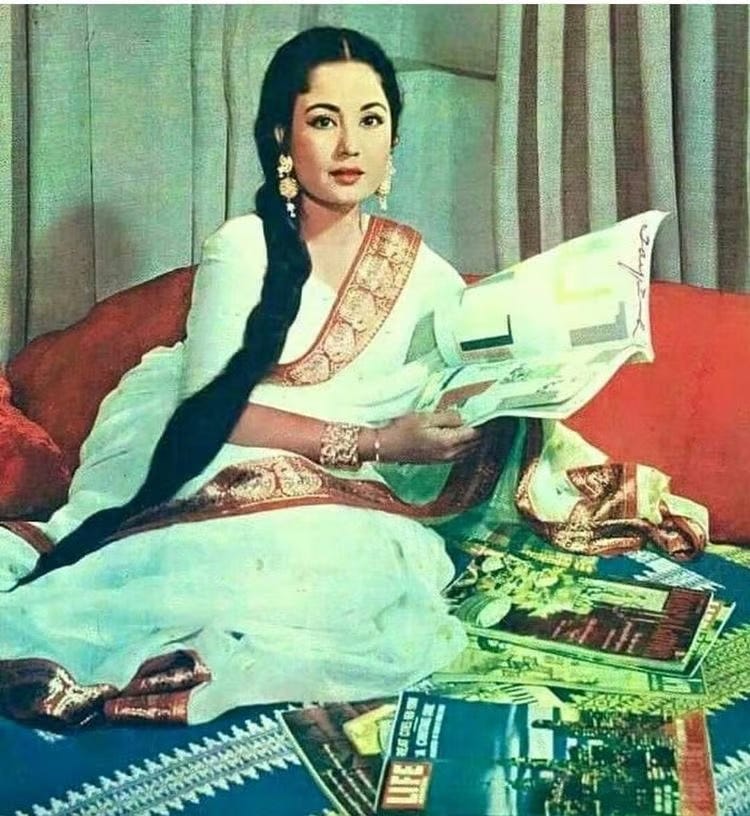Meena Kumari, in her own words
Actress by day, poet by night: Meena's verses were attempts to reclaim agency over her life’s story and move beyond the tragedy queen mould she was typecast in
An essay I wrote for the magazine Critical Collective’s November 2023 edition, republished here.
What people say of a public figure in the days after their death—and what is omitted—can define their legacy thereon. In the case of Meena Kumari, one of Hindi cinema’s biggest stars of the 1940s, ’50s and ’60s, her colleagues and fans invoked her acting prowess, as well as the tragedies of her personal life. A decade of starring in films such as Sahib Bibi aur Ghulam and Pakeezah earned her the title of ‘the great tragedienne’.
This perception was amplified by news of her troubled marriage and dwindling fortunes. Addiction issues and failing health meant that her admirers grieved and pitied her. Only a few voices, like the lyricist Sahir Ludhianvi, remembered her for an often overlooked, distinct chapter of her life—her poetry. She wrote under the takhallus (pen-name) Naaz, and much of her verses were published posthumously by the lyricist Gulzar, to whom she bequeathed her diaries.
Meena’s writings, characterized by an unvarnished and unadorned nature, provide a valuable glimpse into her inner world. They are at once a reminder of how people saw her on celluloid, and a window into parts of herself she wished to call attention to. Her nazms and ghazals include reflections on the world of entertainment, society and her own life. They are also reportedly the research material for an upcoming biopic of the actress, being planned by Bollywood fashion designer Manish Malhotra for his directorial debut.
In one of the earliest biographies of the actress, author and journalist Vinod Mehta paints a portrait of an introspective woman who kept personal diaries and found refuge in poetry—that of favourite writers, such as Faiz Ahmad Faiz, Ghalib and Mir, as well as her own. Her contemporaries, Nargis and Madhubala, did not have the same interest in writing, making Meena singular in her honing of this craft.
Commenting on the angst in her words, music director Naushad said that she wrote poetry to fight the sense of betrayal she felt in real life. Having been a child actor and her family’s breadwinner since age 4, she’d felt exploited by others at different points of time. A poem titled “Sheesh’e ka Badan” (A Body Made of Glass) seems to speak of this betrayal, and her resolve to end this injustice. In it, Meena writes:
“My anklets turn around to say:
No thorn will prick me now
Even life can no longer taunt me”
Meena’s motivations to turn to poetry are as fascinating as the creative output itself. Noorul Hasan, who translated her verses and published a volume on them, is of the opinion that her poetic self resembled her on-screen persona. This echoes biographer Mehta’s observations of how she began to embrace the tragic disposition and fate of the characters she played. Consider the diary entries and conversations where the actress admitted to being haunted by the role of the self-destructive Chhoti Bahu she took on in Sahib Bibi aur Ghulam, and even mentioned how her dependence on alcohol made her wonder if she was turning into this character.
Hasan further writes: “Her voice [in poetry] is very often the tremulous, quavering voice of an invincible Indian woman in the direst of straits.” Yet, there is a lingering feeling that Meena is trying to set the record straight and reclaim agency over her own life story. In the eyes of observers like Mehta, the actress presents a compelling subject for a biopic, owing to the turns her life took as well as her screen presence. “Meena Kumari is a poem, a poem of infinite exquisiteness that the Maker must have composed in a state of esemplastic generosity,” declares the cover of the album I Write I Recite, a selection of the actress’ poems she recited by herself and set to music by composer Khayyam. Amid verbose commentary and public scrutiny, did Meena write because she wanted to be perceived through her own gaze?
In their introduction to Hasan’s book, Philip Bounds and Daisy Hasan elaborate on this argument, mentioning that the actress wished to break through the ‘Tragedy Queen’ mould she had been typecast in, and evoke the subtler aspects of her persona, such as her sensitivity. Not only was she distancing herself from her public and on-screen image, she was also criticizing the film industry. Bounds and Daisy write: “Condemned in her work as an actress to go along with the industry’s crude stereotypes of female virtue, Meena Kumari strove to evoke the multi-layered realities of what she regarded as her authentic self.”
In “Badal Aur Chat’tan” (Cloud and Rock), she likens the subject of the poem to a cloud that arrives with the wind and lingers for a while, only to vanish. In contrast, she describes herself as a steady rock. This mirrors her relationship with the audience and fans whose admiration was fickle, and subject to what they heard and read of her. Her disillusionment with show business and stardom also comes through in “Khali Dukan” (The Empty Shop). Time, in a personified form, becomes a seller of wares, such as paper flowers of fame and wax dolls of wealth. But the poetess is not in want of them. What she desires instead is…
“A handsome dream of love
Which can cool my inflamed eyes
A moment of perfect intimacy
Which can soothe my restless soul”
Writing in free verse seemed to be her preference, as sentences and thoughts bled into successive lines, or were neatly carved into stanzas through her method of structuring. Hasan describes her style as being conversational, striking “an uncanny intimacy or rapport with the reader”.
Despite Gulzar’s appreciation of Meena’s poetry, especially her sense of imagery, the actress’s writings were not well-received by most renowned (male) writers of her time. For instance, K.A. Abbas criticized her for her lack of depth and quality, while her husband, Kamal Amrohi, thought she was ignorant “of all that poetry is about”. Perhaps, this had to do with a disdain for confessional, autobiographical poetry by women, or more specifically, a disdain for Meena’s larger-than-life visions of feelings and experiences.
I wish to argue that the substance of Meena’s verses—her distilled, mostly personal thoughts—matter far more than their perceived literary value. Earlier this year, in August 2023, a poetry walk organized in Mumbai took participants through the neighbourhoods where the actress had lived in, revealing the contexts in which she wrote. One of them was Iqbal Bungalow, where she spent several hours in the garden as a child, which may have inspired many of the nature and moon metaphors in her poetry.
In “Zindagi Yeh Hai” (This is Life), Meena plainly says that her life has been so dedicated to the service of others, that her work has invisibilized her real self.
“From morning to night
We must do things for others.
The living picture must be vivified
In which there is no trace of one’s self.”
The true test of a Meena Kumari biopic will lie in whether it replicates other people’s visions of the actress, or asks us to see her for what she was, in her own eyes and words.





